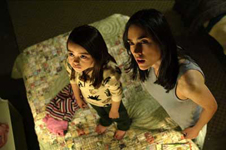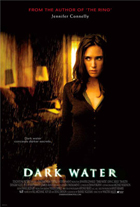Dark Water
|  Those approaching Dark Water as a straight horror movie are bound to be disappointed. The ad campaign has emphasized the film’s association with the Japanese horror hit Ringu (1997) and its 2001 American remake (they were both based on a source novel by Kôji Suzuki), but Dark Water (which is itself a remake of 2002 J-horror thriller directed by Ringu’s Hideo Nakata) is purposefully lacking in both the shock-scares of those movies and their nihilistic overtones. Rather, this is a psychological drama with decidedly sentimental overtones; it’s a story about parental love that also happens to feature a ghost and a lot of supernatural dirty water. Those approaching Dark Water as a straight horror movie are bound to be disappointed. The ad campaign has emphasized the film’s association with the Japanese horror hit Ringu (1997) and its 2001 American remake (they were both based on a source novel by Kôji Suzuki), but Dark Water (which is itself a remake of 2002 J-horror thriller directed by Ringu’s Hideo Nakata) is purposefully lacking in both the shock-scares of those movies and their nihilistic overtones. Rather, this is a psychological drama with decidedly sentimental overtones; it’s a story about parental love that also happens to feature a ghost and a lot of supernatural dirty water.In fact, the most horrific thing about Dark Water is the plumbing. Anyone who has ever been forced by financial straits to move into a less-than-exciting apartment will immediately empathize with Dahlia (Jennifer Connelly), a young woman recently separated from her philandering husband and caught in a bitter custody dispute over their five-year-old daughter, Ceci (Ariel Gade). She and Ceci move into a leaking apartment on New York’s Roosevelt Island, the slow decay of which is hardly masked by a fresh coat of paint touted by the overenthusiastic real estate agent (John C. Reilly, adding a skilled touch of comic relief to the otherwise dour proceedings). The building itself is one of those blocky, misguided modern behemoths that were so popular in the 1960s and ’70s; its no-frills functionality has a soul-killing weight, and Brazilian director Walter Salles (The Motorcycle Diaries), making his Hollywood debut, structures the film visually around gray cement and hideously perfect architectural geometry (everything is in blocks and rectangles) that seems designed to restrict and retard light. The building is looked after by Mr. Veeck (Pete Postlethwaite), an Eastern European who delivers most of his lines in a scowling mumble. He isn’t much of a caretaker, as he tries to get out of fixing the constantly dripping leak in Dahlia’s bedroom. Taking matters into her own hands, Dahlia ventures upstairs and discovers that the flooded apartment directly above her was recently occupied by a Russian family -- a father, a mother, and a young girl -- who have seemingly disappeared into thin air. There are small clues dropped here and there that the little girl might still be around, in physical or spiritual form. Ceci finds a pink Hello Kitty backpack on the roof and she takes to talking to an “imaginary friend” named Natasha. From a strictly generic standpoint, this is all of the “been there, done that” variety. The film doesn’t hold many surprises in terms of Natasha’s true identity, and those who have seen The Ring and the recent American sequel will recognize virtually every one of Dark Water’s narrative turns, from the discovery of a body to the demands of a ghost child that her desertion be rectified by the living. Boiled down to its base elements, Dark Water is virtually the same story as The Ring, albeit without any killer videotapes. However, the film still works because novelist/screenwriter Rafael Yglesias (Fearless, From Hell) keeps the story focused on its themes of familial breakdown and the lasting effects of childhood trauma. Like the best American horror films of the 1970s, Dark Water uses the supernatural and the horrific to explore the disintegration of the American family and all that entails. The real horror in the film is not so much ghosts and dank water, but rather the psychological turmoil and the exhaustive emotional wringer parents go through when divorcing and trying to maintain a connection with their children, who are invariably caught in the middle. Dahlia’s split from her husband (Dougray Scott) is particularly nasty (one of the film’s first scenes takes place in a mediator’s office and quickly goes sour), which taxes Dahlia’s already overburdened emotional plate. The breakdown of her marriage dredges up old memories of her childhood, which was tormented by an abusive father and a negligent, alcoholic mother. Thus, the trauma of Dahlia’s impending divorce is literally embodied in the apparently supernatural goings-on in her apartment building, the connection made even stronger by the suggestion that it might all be a hoax perpetrated by her husband in an attempt to make her look crazy. In this sense, Dark Water is a surprisingly moving film, one that captures the ugly essence of what happens when love turns to hate. Jennifer Connelly turns in a particularly good performance, channeling some of the same despondency and frustration that she played so well in The House of Sand and Fog (2003). Despite her natural beauty, there is something infinitely approachable about Connelly, and she conveys a genuine sense of fragility staved off by a fierce resolve that is always in danger of crumbling. Some may find Dark Water’s final moments a bit sentimental -- corny even -- but when viewed in relation to the battle Dahlia puts up through the entire film to protect her daughter and her own sanity, it is only fitting. Copyright ©2005 James Kendrick Thoughts? E-mail James Kendrick All images copyright ©2005 Buena Vista Pictures |
Overall Rating: 

 (3)
(3)


